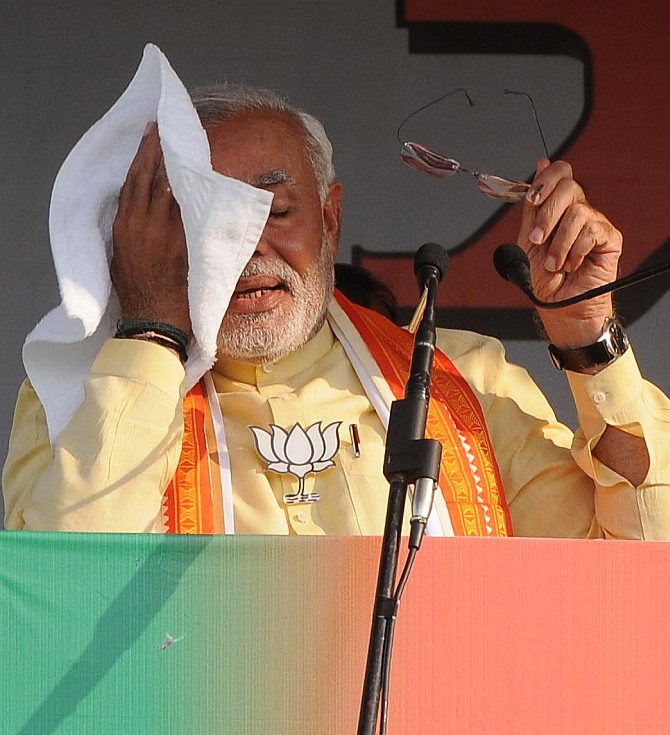
'Counting the votes of allies, the NDA tally would barely exceed 200 million, or just a quarter of the number of eligible voters. That should give pause to the euphoric new ruling dispensation.'
'It has a fair distance to go yet if it wishes to shed the tag of right-wing Hindu nationalist party in any meaningful way,' says Shreekant Sambrani.
The sweeping victory of the Bharatiya Janata Party and the National Democratic Alliance it led is remarkable not just for the numbers. Exceptional though they are, the drive of one man alone who made it possible outshines them: Narendra Damodardas Modi who, on May 21, will become India's 15th prime minister, the high office he assiduously sought, but was not expected to win until very recently.
The British historian Ian Mortimer called Henry Bolingbroke, who as Henry IV was the founder of the Lancaster dynasty as the 'self-made' king of England. Henry, a Plantagenet, was not in the line of succession and was thus considered most unlikely to be the king. He is supposed to have used his Plantagenet lineage and elaborate planning to achieve his ambition of being the monarch.
That sequence of events would also appear to fit Mr Modi's remarkable ascent. He had the right pedigree, but his place in the BJP's pecking order was not high enough until 2012, when he won his third term in office as the chief minister of Gujarat.
Even then, he was one among several BJP leaders of the next generation. His prospects of moving to the top were considered blighted because of the 2002 Gujarat riots that occurred under his watch.
Yet ambition burned bright in the breast of the one-time pracharak of the Rashtriya Swayamsevak Sangh. Shekhar Gupta, the editor-in-chief of The Indian Express observed in December 2007 that the next general election could see him at the top of the BJP. I had also made a similar comment in my analysis of the state elections. The wisdom then was that this would never come to pass given his record.
Only Mr Modi believed in his manifest destiny. He carefully charted his campaign for the top, much like Henry establishing the legitimacy of his claim through descent. Mr Modi set about showcasing his achievements in Gujarat. He also benefitted from the grave discontent brewing in the country largely on account of the mishandling of the economic situation by the United Progressive Alliance during its second term.
Mr Modi's victory in the 2012 state election stood out against the backdrop of pervasive resentment of incumbent governments. Mr Shivraj Singh Chouhan of Madhya Pradesh and Dr Raman Singh of Chhattisgarh also defied anti-incumbency, but a year after Mr Modi had done so.
On the eve of the state elections in 2012, I had observed that 'Modi quite clearly nurses national ambitions. He needs a larger constituency with which to bond. That movement must be based on a feeling of antipathy and injustice. He will need to stress a sense of deprivation to appeal to people outside Gujarat' (Modi: Demagogue or democrat? Business Standard, December 18, 2012).
That was indeed the substance of his strategy. He hammered away at the failures of the UPA. As an alternative, he highlighted what has since come to be called the Gujarat model. Critics have tried to find faults and infirmities in the model, but voters all over India have found it appealing.
...
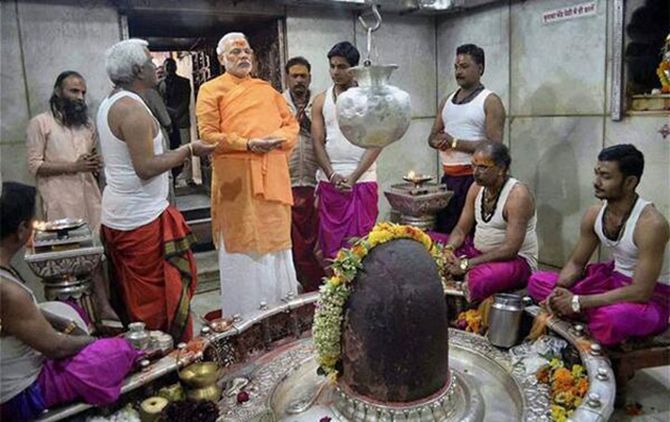
Mr Modi's rise was by no means irresistible. He had first to overcome resistance in his own party, especially from the presiding patriarch, Mr L K Advani. His acceptability to the partners in the NDA was a major hurdle. And if perchance, he could prevail against these, the received wisdom, (which I shared) was that winning 180 seats, the minimum required to even have a shot at forming a post-poll coalition, out of the 360 where the BJP had a presence was a Herculean task.
What happened in the year since last June when Mr Modi was named to head the BJP campaign is fresh in our collective memory. Suffice it to say that taking the BJP to a majority on its own and the new NDA past 300 seats is an achievement unmatched in three decades.
No matter how the credit for this is sliced among the Congress ineptitude, RSS mobilisation of support and the media-based campaign, the largest piece of the pie must surely belong to Mr Modi alone.
His energy was evident in barnstorming the country like no one has ever done before, Arjuna-like relentless focus on the target and none-too-subtle variations of campaign themes -- development for the most part, but discreet appeals to caste and community affinities when needed -- made this election a successful referendum on the person of Mr Modi.
That is what makes him India's first self-made prime minister.
Others have made no secret of their prime ministerial ambitions in the past. Mr Morarji Desai, Mr Charan Singh and Mr Chandra Shekhar even succeeded in their quest. But Mr Desai was a compromise choice, never very popular, and the other two backed into the office through intrigue. None lasted long.
Mr Modi is the only one to have campaigned up front and won handsomely, with no threat to a full term.
...
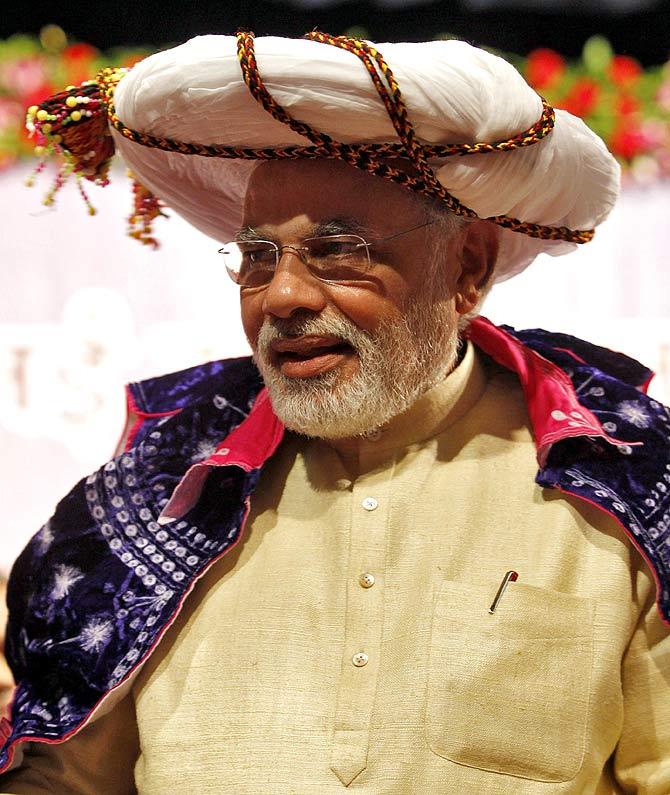
The people have spoken! is the general theme of post-election analyses in India. What follows is often a minute parsing of even barely-heard whispers. Not so in 2014. The people have given a message that is not just clear, but more importantly, loud as well.
The vote figures tell an equally significant tale. The BJP is poised to garner over a third of the total 550-plus million votes cast, or about 184 million. That is 106 million more votes than the 78 million it polled in 2009. This increase of 135 per cent over the 2009 base is humongous.
It compares with the overall polling numbers in the second largest democracy in the world, the United States. Barack Obama and Mitt Romney together held 125 million votes in the 2012 presidential election.
These numbers indicate that the BJP has been able to go well past what is otherwise called its core constituency, estimated to be under 20 per cent of the electorate. An increase in the BJP votes in its traditional strongholds in the North and the West would have been expected. But the party has now a significant presence in Assam, larger than that of the Congress.
It has received reasonably respectable double-digit vote shares in West Bengal, Odisha and even Tamil Nadu, where it has been only a minor presence until now, even though that has not translated into many seats.
Equally noteworthy is the fact that it has swept the polls in the two largest metro cities of Delhi and Mumbai, where it had no seats five years ago.
There is much anecdotal evidence to suggest that the BJP voters are now well spread across age, income, location and gender barriers.
Muslims in all states constitute the only overwhelmingly hostile segment to the new ruling party.
Therefore, it may not be far from truth to say that barring Muslims, the BJP occupies the centre of the Indian polity that belonged to the Congress until recently.
...
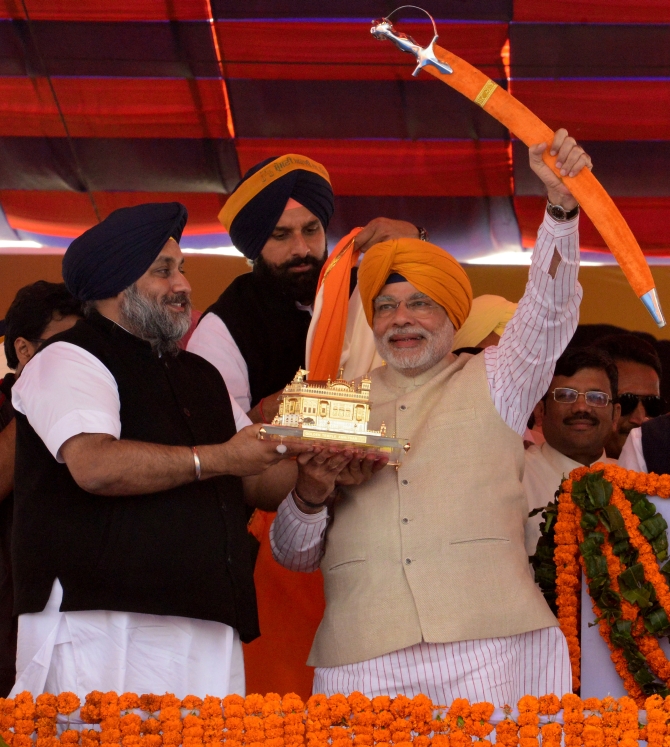
What has caused this change? Two factors were involved, one negative and one positive. The negative was the abysmal Congress/United Progressive Alliance (UPA) performance, especially on the economy, which has been discussed to death. Suffice it to say that a desperate people were ready to embrace an alternative that offered hope.
This is where the positive in the form of the BJP's claims of good governance and development in the states it rules appealed. More specifically, the claim that Modi's stewardship of Gujarat for the last decade leading to its pre-eminence held an irresistible attraction all across the country.
The BJP strategy in 2014 comprised mostly of Modi wielding the sledgehammer against the UPA. Critics tried to find faults and infirmities in what has come to be called the Gujarat model. But voters all over India found the Gujarat narrative appealing.
It was 'foreign-like' with assured 24x7 power, good roads and water managed from its own resources even in moderate drought conditions, which seem to prevail always in Gujarat.
Efforts of the Congress and latterly, the Aam Aadmi Party, to debunk these as myth found little traction, as not just reportage but the election performance tell us.
As in 2004 and 2009, state assembly elections in central India -- Madhya Pradesh, Rajasthan and Chhattisgarh -- preceded the Lok Sabha polls. As in 2003 and 2008, the BJP won Madhya Pradesh and Chhattisgarh handsomely in 2013. The Congress took heart in the fact that it did well in the general election that followed despite these hiccups. That did not happen, largely because the main issues of the state elections remained in sharp focus six months later.
I had observed in December 2013 that 'the famous victory of the BJP is in fact the rout of the Congress'. And that is not confined to the Hindi heartland alone. Voters will stick to their ABC (Anybody But Congress) in state after state, if elections are held within the foreseeable future (It's the aam aadmi's pocket, stupid!, Business Standard, December 9, 2013).
But Modi and the BJP knew that they were not exactly running a campaign for sainthood. The election schedule was a Godsend for them. Almost all urbanised and more advanced states had finished polling before the end of April. The last phases in May involved about 50 seats in eastern Uttar Pradesh and Bihar which have always been fertile spots for appeals on the basis of caste and community.
The BJP seamlessly shifted gears to add none-too-subtle pitches to these factors, in addition to the development and governance issues which were at the core of the BJP appeal earlier. This Janus-like strategy has paid off well.
...

There is another way also to look at the election numbers. Counting the votes of allies, the NDA tally would barely exceed 200 million, or just a quarter of the number of eligible voters. That should give pause to the euphoric new ruling dispensation. It has a fair distance to go yet if it wishes to shed the tag of right-wing Hindu nationalist party in any meaningful way.
There is much apprehension aboard about what impact the fresh NDA tenure in office will have on this multi-cultural country. All evidence points to the continuing poor Muslim voter response to Mr Modi and the BJP. But there is also considerable disquiet among substantial sections of the non-Muslim population as well, as can be seen from the passions the debate about the future under Mr Modi arouse.
Whether that leads to a lasting legacy is yet to be seen. Henry IV had a troubled reign, not only because of the hostilities from his formidable enemies, but also because in the words of William Shakespeare, who wrote two masterly plays on Henry IV, the monarch agonised, 'How many thousand of my poorest subjects/Are at this hour asleep'.
India faces myriad economic problems, which would try the abilities of the wisest of its leaders. This has been a subject of much debate and the last words are far from being said.
The biggest challenge facing Mr Modi lies elsewhere.
...
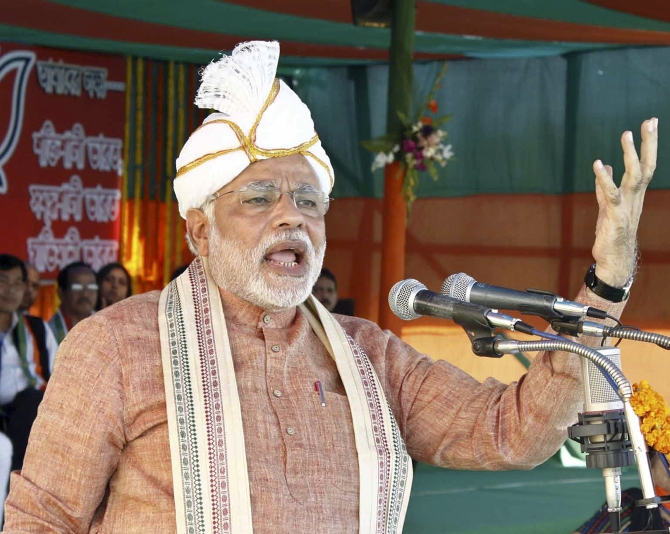
The task now is to carry forward the remaking of the party and its undisputed leader begun some years ago. That would not be easy, but is essential. Recep Tayyip Erdogan, the candidate of what is commonly referred to as the Islamist conservative Justice Party of Turkey, came to power in 2003 under similar conditions.
His economic performance and acceptability to the rest of the world improved in the first half of his decade in power, but now are under severe strain. And the Islamist tag refuses to fade away, despite no major evidence of the party of the government pursuing such objectives.
Twenty-five years ago, an India exhausted by the odour of political corruption thought it had found a messiah in Mr V P Singh the crusader for clean government, only to discover that the apostle presumably blessed with a healing touch had plunged the country into almost insurmountable divisions in less than a year. The country is still riven by them.
The Bard's Henry had the last word, 'Uneasy lies the head that wears the crown'.